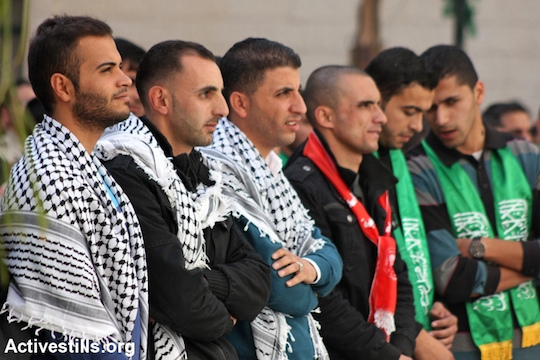‘It is becoming harder and harder to proclaim one’s affinity for Palestine without an immediate and echoing retort accusing you of either being too quixotic or too compromising.’
By Talal Alyan

There is something so dreadfully boring about writing a piece about reconciliation. I felt compelled to do so last summer about the broad “Left” and their tendency to devour each other; weeks later I revisited the piece and concluded that it had been a waste of my time. It was too utopian of a plea. So why then do I feel compelled to make a similar plea to Palestinians and their allies? It is because Palestine for me is less of an abstraction. It is not an ideology. As though possessed, I can never alleviate the relentless impulse to mourn and remember and, perhaps most pervasively, insist that we do better for Palestine, that we always put her and her most tormented children first.
It is hard to make sense of the discourse on Palestine today. There is a new, or perhaps not so new, culture that has been cultivated among many pro-Palestinian segments in the West. It is a culture that eagerly awaits any opportunity to defame other Palestinians, one that almost yearns for perceived betrayals and the act of purging.
It is becoming harder and harder to proclaim one’s affinity for Palestine without an immediate and echoing retort accusing you of either being too quixotic or too compromising. I am guilty of these compulsions myself. Having vehemently argued for two-states and one-state, eventually I concluded that the conversation was premature and generally irrelevant. But regardless of where my political allegiances lie, I could always count on the scorn of others, the scorn of those who I know share my compassion and commitment for Palestine. It was easy to digest the absurd accusations of anti-Semitism from pro-Israeli hawks, it was much more draining to reconcile with denunciations from people whose side I thought I shared.
I have been called a liberal Zionist and I have been dismissed as too idealistic for demanding that the right of return cannot be compromised without a mandate from Palestinians. I have interned at the American Task Force on Palestine and I have insisted that BDS is an essential component of resistance. I have been accused of being a mouthpiece for the PA and I have received threats from anonymous men in Ramallah for writing about PA abuses.
Henry Wallace once angrily asked the antagonistic American public, “Am I an American?” And so in the same vein I ask you: I have defended a two-state peace settlement, am I a Palestinian? I have argued for a one-state solution, am I a Palestinian? I have determined there is no point dwelling on hypotheticals, am I a Palestinian? Perhaps, I will now be accused of being too fickle. But it is precisely our unwillingness to reflect and meditate on the arguments of fellow Palestinians, that our initial instinct is always to attack one other, that I implore you, and myself, to relinquish.
Make no mistake, I ask not that you forfeit your own convictions and positions. I say grasp them. Do so furiously and never renounce them, not at the behest of any intimidation or scorn, but instead only if you are convinced they no longer suit your aspirations for Palestine.
And of course, there must be room for critique and judgment; God knows we have no lacking in failures. But let that not be our sole preoccupation. Let that not consume our entire energy and efforts. It would be a betrayal to ourselves and, more importantly, to those who continue to face the more perturbing elements of our predicament. We cannot barter with their suffering; we cannot spend so much of our time being the arbiters of who is a real Palestinian supporter and who is a traitor. This fetish for accusing anyone who has a different vision or approach of apostasy comes at a cost. It only serves to alienate sympathizers from the Palestinian cause and further the aims of rejectionists by effectively offering them something to point to and remark, “they can’t even get along with each other.” It all comes at a cost to those who suffer most from the status quo; they deserve better from us than Twitter wars and hit pieces.
There is so much more work to be done and I have never disputed our willingness and capacity to do it. But it is a delusion, a shortcoming of almost all of ours, to think that the road to Jerusalem can be paved with the slander of other Palestinians.
I was told once in Beirut that we Palestinians were fated to become exiled twice, “first from our country — and then by our countrymen.”
Let us ensure that we elude this latter fate as confidently as we will, indisputably, overcome the former.
Talal Alyan is a Palestinian freelance writer currently living in Syracuse, New York. Follow him on Twitter: @talalalyan.
Related:
Confronting our tyrants: Incarceration and torture in Palestinian prisons
Palestinians and the Syrian Revolution: Lessons from the fight against fascism
